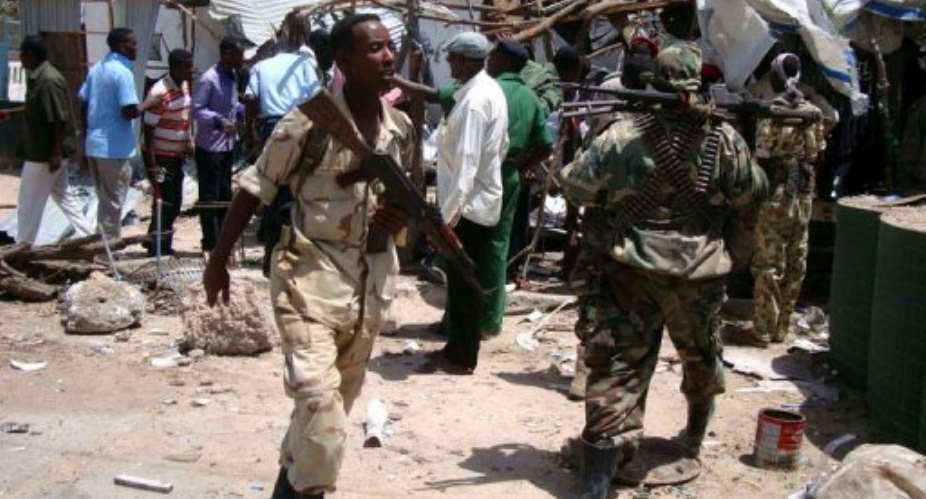MOGADISHU (AFP) - A suicide bomber killed at least five people in an attack Wednesday at the compound of Somali President Sharif Sheikh Ahmed that was claimed by Al-Qaeda affiliated Shebab rebels.
The bomber detonated an explosives vest at the heavily guarded compound, also leaving several people wounded, ahead of Sharif's return from a visit to neighbouring Ethiopia, security officials said.
Shebab insurgents said one of their volunteers had carried out the attack and claimed that 16 people had been killed.
"The mujahideen carried out a spectacular martyrdom operation inside the presidential palace of the apostate Somali regime," the group said in a Twitter post.
"The highly exceptional operation took place inside the compound while apostate officials were holding a meeting there."
The site of the attack was splattered with blood, human remains and destroyed plastic chairs. Residents looked on in shock as security officials inspected the scene, an AFP reporter said.
Five people, besides the bomber, were killed in the attack at the gate of the parliament speaker's residence, which is located inside the Villa Somalia compound that houses the presidency.
Muktar Abdi Yusuf, a security official at the presidential residence, said: "The situation is under control and the wounded have been taken to hospital."
The speaker, Sharif Hassan Sheikh Adan, had gone to welcome the president at the airport, another security official said.
The hardline Islamist group has resorted to guerrilla tactics since abandoning fixed bases in the war-riven capital Mogadishu in August, and has claimed responsibility for previous deadly attacks.
In October, it carried out its deadliest suicide attack in the capital when a bomber rammed an explosives-laded vehicle into a government compound, killing at least 82 people.
A Shebab suicide bomber also killed 15 people in February at a cafe near the presidential palace.
The Horn of Africa country has had no effective government since 1991, allowing the Shebab and other militia groups to fill the vacuum.
The insurgents have been fighting to overthrow a weak Western-backed Somalia government propped up in Mogadishu by a 10,000-strong African Union force comprising troops from Djibouti, Burundi and Uganda.
The hardline Islamists, who control large swathes of territory in southern Somalia, have in recent months come under pressure from the armed forces of neighbouring Kenya and Ethiopia in the far south and in the west.
Ethiopian forces recently ousted the Shebab from a key southern Somalia stronghold, and the Shebab have also been battered by Kenyan air strikes.
However, analysts warn the Shebab are far from defeated and remain a major threat, especially now they have switched to guerrilla tactics.
At a London conference last month, international powers pledged to boost aid for Somalia to tackle Islamist militancy, piracy and political instability, warning that failure to help could hurt the rest of the world.
The mandate of the government expires in August and the fragile administration's backers have ruled out any further extension, pressing for the formation of a new administration that can impose nationwide authority.





 There’s nothing you can do for us; just give us electricity to save our collapsi...
There’s nothing you can do for us; just give us electricity to save our collapsi...
 Ghanaian media failing in watchdog duties — Sulemana Braimah
Ghanaian media failing in watchdog duties — Sulemana Braimah
 On any scale, Mahama can't match Bawumia — NPP Youth Organiser
On any scale, Mahama can't match Bawumia — NPP Youth Organiser
 Never tag me as an NPP pastor; I'm 'pained' the 'Akyem Mafia' are still in charg...
Never tag me as an NPP pastor; I'm 'pained' the 'Akyem Mafia' are still in charg...
 Your refusal to dedicate a project to Atta Mills means you never loved him — Kok...
Your refusal to dedicate a project to Atta Mills means you never loved him — Kok...
 2024 elections: I'm competent, not just a dreamer; vote for me — Alan
2024 elections: I'm competent, not just a dreamer; vote for me — Alan
 2024 elections: Forget NPP, NDC; I've the Holy Spirit backing me and nothing wil...
2024 elections: Forget NPP, NDC; I've the Holy Spirit backing me and nothing wil...
 2024 elections: We've no trust in judiciary; we'll ensure ballots are well secur...
2024 elections: We've no trust in judiciary; we'll ensure ballots are well secur...
 Performance tracker: Fire MCEs, DCEs who document Mahama's projects; they're not...
Performance tracker: Fire MCEs, DCEs who document Mahama's projects; they're not...
 Train crash: Railway ministry shares footage of incident
Train crash: Railway ministry shares footage of incident
